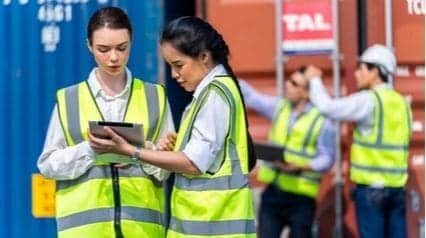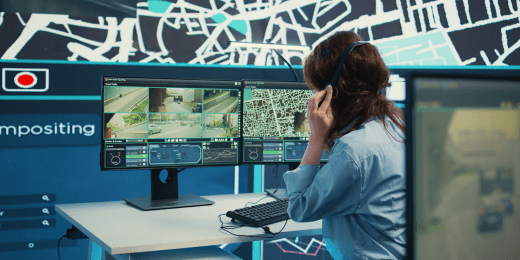Warehousing Logistics (Storage Logistics)
Learn what logistics is in warehousing, how it works, how companies can effectively execute it, and how you can make the entire process much easier.

Published 13 Dec 2023
Article by
6 min read
What is Logistics in Warehousing?
Logistics, as it applies to warehousing, refers to keeping all process components as organized as possible. This is to ensure that operations run smoothly and the team encounters no problems.
Warehousing logistics pertains to the personnel, equipment, and spaces involved in warehousing. So, implementing proper warehousing logistics requires companies to consider the goods that they need to store, where they store them, how they store them, and how they can make adjustments to optimize the process.
Modern warehousing logistics is a much more complex subject than it used to be. The e-commerce market brought in an estimated $768 billion in revenues in the US according to a study conducted by the Statista Research Department; many websites in the e-commerce sector launch every day.
E-commerce retailers have different warehousing logistics than standard retailers, which complicates things. While small and medium businesses can warehouse goods in-house until they run out of space, e-commerce retailers usually have to find other places to store their products, which is where things get complicated.
With that said, proper warehousing logistics are crucial for any company.To ensure everything from receiving raw materials to the shipment of products runs smoothly—companies need to practice warehousing logistics.
Why is Warehousing Logistics Important?
Making and selling products are some of the first and last steps in the process. But in between that, you need to find a place to store the products and figure out a system for when theproducts arrive and when you have to ship them out to customers.
This gives customers a better experience. For online retailers, if you can ensure that your goods are always in stock, you ship out items as soon as they arrive, and efficiently perform order fulfillment—they will be much happier with your website.
For brick-and-mortar retailers, you need to ensure that whatever a customer wants from your store, they can get it. If goods are constantly out of stock at a certain store, customers may hesitate to come back and customer loyalty may suffer as a result.
This is where warehousing logistics comes in. Whenever a company has good logistics, they can ship out products faster, keep track of products that need restocking, and ensure that each cog is working properly and keeping the process fast, smooth, and efficient.
Without warehousing logistics, it can be hard for companies to track their goods. Additionally, warehousing logistics, when executed properly can cut down transportation and shipping costs while also reducing waste.
What are the Components of Warehousing Logistics?
As a part of the bigger umbrella of transport and logistics, and industrial logistics, warehousing also includes smaller elements. If you operate a business where you sell physical goods to customers, warehousing logistics is at the core of operations. Keeping a warehouse running smoothly ensures that all other facets of your business follow suit.
To prepare a proper warehousing logistics plan, you need to include these two key components.
Management
Management simply refers to overseeing the day-to-day operations of the warehouse. Every aspect of your warehouse operations need to work towards the goal of smooth, efficient, and safe operations. So, management includes training employees, introducing new team members, maintaining equipment, and following safety practices.
For proper warehouse management, it’s important to forecast the labor volume. Additionally, managers are encouraged to have all the appropriate licenses for the equipment and ensure that everyone manning the equipment has gone through proper training and has the right certifications.
You can’t leave any stone unturned when managing warehouse operations. If you forget to manage or plan out a certain aspect of operations, it could have costly consequences.
Implementing Management Systems
Once you have a proper plan, you need a way to implement that plan. This is why warehouse management systems come in.These are programs that you can use to optimize the management process from end-to-end and make things much easier for the warehouse personnel.
Modern retailers require modern solutions. Gone are the days of manually generating reports and writing down schedules on a piece of paper. With a quality management system, you give your personnel a better workflow that garners results.
A great example of this is SafetyCulture (formerly iAuditor).Used by industry leaders in manufacturing, logistics, retail,inventory management, and many others, this app allows you to create reports and schedules, designate tasks, and even communicate with other team members. This greatly simplifies the process and allows the staff to keep things in the warehouse running as smoothly as possible.
Where Does Warehousing Fit into my Business?
Warehousing refers to the entire process of storing physical goods before shipping them off and selling them to customers. This is a crucial part of running a retail business as proper storage of goods reduces waste, increases efficiency, and can keep unexpected and unnecessary expenses at bay.
The better a company runs its warehouses, the better the customer experience will turn out.Fast shipping times are crucial in the modern market. With big eCommerce platforms like Amazon offering same-day shipping and similar services, retailers need to ensure their warehouse is running properly in order to keep up.
Create Your Own Warehousing Logistics Checklist
When the warehouse is organized, restocking, receiving new products, and shipping them out is much easier. This way, customers can get their hands on the product soon after ordering them, increasing customer satisfaction.
Warehousing is important whether you run a traditional retail business or an eCommerce platform. For example, if a company executes their warehousing logistics properly, they can ensure they have as many products on the shelves as possible, which promotes customer loyalty and entices them to keep coming back to your store.
Stay Organized & Keep Your Warehouse Running Smoothly with SafetyCulture
SafetyCulture is an all-inclusive app that can make warehousing much easier for the entire team as well as for third-party logistics providers.This is an inspection, organizing, report-generating, and workplace communications app that can be a huge help in warehousing logistics.
SafetyCulture Operations Platform
What is SafetyCulture?
SafetyCulture is the only app your company needs to keep warehouse logistics smooth. For example, SafetyCulture can generate reports on your warehouse. With the app, personnel can keep track of what products are in-stock, what needs to be restocked, and save the report all on the app. From there, other team members can view the report to keep everything transparent and clear.
With SafetyCulture, you can create checklists from convenient templates. This can help you ensure that the staff leaves no stone unturned when conducting inspections. That way, all the bases are covered and no issue will fly over management’s head.
In line with the previous feature, companies can use SafetyCulture to create proper workflows for the staff. You can also include security restrictions to ensure that all the confidential information and data on your operations remains that way.
And to make sure all the gears are locked in and everyone is doing the right tasks, you can even facilitate workplace communications on the app. This gives everyone a single place to communicate with the team or with individual members.
Warehousing logistics can be complex, but there are modern solutions that can simplify it. If you need to create an organized and efficient system for your warehousing process, look no further tha SafetyCulture.
Related articles
Operations
Business Processes

Understanding the Importance of Process Automation Reliability
Learn how reliable process automation is key to safe, consistent operations and how it minimizes quality and compliance risks.
Logistics
Operations

Transportation and Logistics: What’s the Difference?
Learn about the importance of transport and logistics within the supply chain and how it is used in business operations.
Logistics
Operations

An Overview of Transport Network Analysis
Learn about transport network analysis and how network-level insight improves reliability and reduces operational risk.